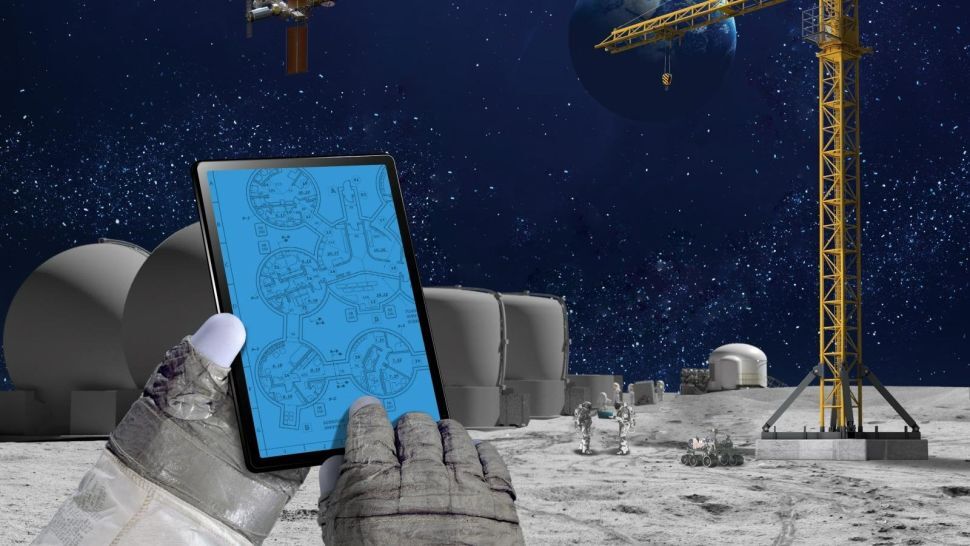8.09.2022
Surely, the idea of surviving and thriving on the moon is a first-rate realization ... but not dying there.

An illustration of a lunar base being built by several astronauts. (Image credit: The Aerospace Corporation)
Surely, the idea of surviving and thriving on the moon is a first-rate realization ... but not dying there.
As nations set their eyes on the moon, specialists are starting to plot out international lunar search and rescue plans. The aim is to design, make operational, and deal with legal and organizational matters in case of emergencies on future human moon missions.
To that end, next month, the First International Conference on Lunar Search and Rescue is being held in Hainan, China. The unique meeting of experts is co-organized by the International Association for the Advancement of Space Safety (IAASS) and the Beijing Institute of Technology.
The need for the gathering is fueled by several points: Planting boots on the moon in the 21st century is no longer the province of a single country. There's a coalition of programs from major space agencies, private entities, and new space forces. A range of systems are under development, from circumlunar infrastructure, mobility platforms of various kinds, human lunar landing systems, short-term living quarters and the prospect of permanent bases. Given all this activity, emergencies could happen, situations that will call for the unconstrained mobilization of all possible aids.
Moon motto
"As a kid I joined the Boy Scouts movement and learned the value of their motto 'Be Prepared,'" said Tommaso Sgobba, executive director of the IAASS. He underscores Article V of the United Nations Outer Space Treaty that states: "In carrying on activities in outer space and on celestial bodies, the astronauts of one State Party shall render all possible assistance to the astronauts of other States Parties."
"This is either an obligation to be prepared or an empty statement, because without preparation and coordination, between the United States and China in particular, no international rescue on the moon will ever be possible," Sgobba told Space.com.
The upcoming meeting is a major opportunity to discuss the viability of establishing a lunar search and rescue (SAR) organization to assist astronauts in trouble.
Such a lunar SAR group might be modeled after the International Submarine Escape and Rescue Liaison Office, a military organization that facilitates and coordinates a world-wide response for a distressed submarine and saving lives at sea. That office supports all nations and pursues the involvement of global submarine-operating nations.
"As for submarines, so too in space, the delay between an accident and rescue attempt is short, and international cooperation based on tested systems, simulation, and training is paramount," Sgobba said.

(opens in new tab)
Dedicated emergency capabilities
On one hand, space treaties codify important obligations of search and rescue of astronauts, Sgobba said. However, rendering assistance to astronauts in distress on moon missions calls for development of dedicated emergency capabilities, systems interoperability, procedures, preplanning, and training, he said.
"Emergency assistance requires, first of all, surface-to-surface communication, including wireless ground infrastructure and orbiting relay satellites to solve line of sight limitations," said Sgobba.
An important reality is that the idea of international cooperation on space rescue as a joint project is not new.
Sgobba flags the fact that developing and testing rescue systems and procedures was the idea behind NASA and the former Soviet Union's compatible docking interfaces for the Apollo-Soyuz Test Project in 1975.
Following that was the 1990 International Spacecraft Rendezvous and Docking conference held at the NASA Johnson Space Center, Sgobba points out, to study the need and gather international momentum for setting up a set of common space systems design and operational standards to allow docking and on-orbit interoperability in case of emergency.
Artemis Accords
Fast forward to today, the NASA "Artemis Accords" reiterates the program's international partners commitment to implement the emergency assistance principles of the Outer Space Treaty. Nevertheless, no action has been taken yet to establish some form of cooperation with non-partners countries like China, Sgobba said.
Is section 6 of the Artemis accords meaningless, Sgobba said, as the Artemis signatories commit to taking all reasonable efforts to render necessary assistance to personnel in outer space who are in distress, and acknowledge their obligations under the United Nations Rescue and Return Agreement?

(opens in new tab)
That rescue accord was created by consensus vote in December 1967 and it elaborated on the rescue provisions in Article V of the 1967 Outer Space Treaty.
"Despite containing more specificity and detail than the rescue provision in Article V of the Outer Space Treaty, the Rescue Agreement still suffers from vague drafting and the possibility of differing interpretation," Sgobba believes.
Without interoperability, and assistance simulation/training between US and China-led moon programs, said Sgobba, section 6 of the Artemis Accords is meaningless, as is Article V of the Outer Space Treaty.
Sgobba emphasized that there are a number of technical, legal and semantic interoperability issues ahead, including multi-lingual phraseology for use in emergencies.
"Hopefully, the institutionalized contacts and increased transparency engendered by a lunar SAR international cooperation program could represent an important confidence-building mechanism for wider cooperation on many other space safety and sustainability matters, including space traffic management," Sgobba concluded.
Quelle: SC
